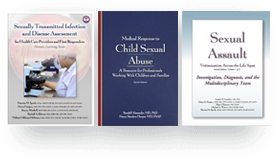The authors have expertly woven together a comprehensive exploration of children who have encountered Adverse Childhood Experiences that is both informative and engaging. This book is an indispensable resource for anyone in the field of child maltreatment, offering a wealth of knowledge, practical guidance, and insightful perspectives.
The authors’ deep understanding of forensic issues is evident throughout the book, making it a trusted companion for professionals, students, and anyone interested in the subject. The content is well-structured and covers a wide range of essential topics, from evidence collection and documentation to legal considerations and the emotional aspects of patient care.
One of the book’s notable strengths is its commitment to staying current with the latest advancements and best practices in forensic mental health. It not only provides a solid foundation but also incorporates up-to-date information and case studies, ensuring that readers are well prepared to meet the challenges of this dynamic field.
What sets Mental Health Issues of Child Maltreatment apart is its compassionate approach. The authors pay special attention to the emotional and psychological needs of patients, which is a critical aspect of our work. This focus on holistic care makes it an invaluable resource for anyone striving to excel in the field of child maltreatment.
Overall, the authors have crafted a must-read book that combines expertise with empathy, making it an indispensable reference for mental health professionals and an enlightening read for anyone interested in this essential field of healthcare. I wholeheartedly recommend Mental Health Issues of Child Maltreatment to all those committed to providing the highest standard of care and justice.
Ann Wolbert Burgess
Professor
William Connell School of Nursing
Boston College
Chestnut Hill, MA
Mental Health Issues in Child Maltreatment is a long overdue comprehensive resource that should be required reading for all mental health professionals, child welfare workers, court personnel and administrators – in fact, all who come into contact with survivors of child maltreatment. The text addresses the biological and neurological manifestations and consequences of child maltreatment providing an up-to-date review of the state-of-the art of our understanding of the sequelae of trauma. The text goes on to provide a thorough review of the challenges of accurate assessment and offers the reader a number of innovative strategies for effective interventions. Finally, the reader is presented with the challenges and strategies for extending our understanding in these areas through research. In summary, this text is an important contribution to capturing what we currently know about child maltreatment and trauma and how to intervene appropriately and effectively.
Paula Silver, PhD
Educator and Administrator
Retired Dean, School of Human Services
Widener University
Chester, PA
This two-volume book offers a fresh perspective of childhood trauma for multidisciplinary professionals. It both questions past methods and offers successful approaches to thinking about, assessing, and treating children. The book has thoughtful, practical, and clinically relevant material for thinking about children who are now adults. Children are our future, and this book promotes means to prevent childhood maltreatment and promote their wellbeing. It honors what a whole person and whole family may need. The books highlight that children do not know what to ask for when they have had adverse childhood experiences. They do not have the resources to work on understanding and influencing what has happened to them. It is clearly up to clinical practitioners to recognize and treat the whole person, a whole family, and overarching systems.
I highly recommend this two-volume book, as it is comprehensive, clear, and compassionate in assessing and treating these often “invisible victims.
Ginny Focht-New, PhD, PMH-CNS, BCB, NADD-CC, BCN














